 Petzlover
PetzloverKromfohrlander is originated from Germany but Moscow Water Dog is originated from Russia. Kromfohrlander may grow 30 cm / 11 inches shorter than Moscow Water Dog. Kromfohrlander may weigh 39 kg / 85 pounds lesser than Moscow Water Dog. Kromfohrlander may live 4 years more than Moscow Water Dog. Kromfohrlander may have less litter size than Moscow Water Dog. Kromfohrlander requires Low Maintenance. But Moscow Water Dog requires Moderate Maintenance
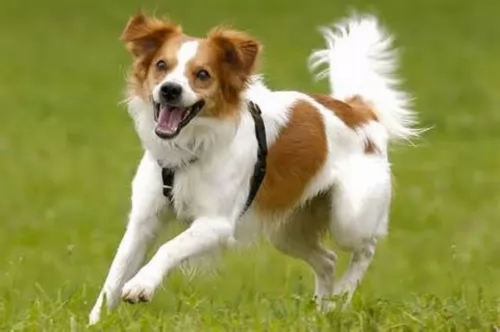 Many troops of World War 1 and World War II would have some or other mascot that they would keep close to them as a reminder of home. The mascot would also inspire them, giving them hope to endure.
Many troops of World War 1 and World War II would have some or other mascot that they would keep close to them as a reminder of home. The mascot would also inspire them, giving them hope to endure.
A Kromfohrlander dog, ‘Original Peter’ was one such mascot – a scruffy Terrier-type dog that army troops from the USA found in France.
This particular dog was accidentally mated with a Fox Terrier, with the breed essentially developing from the military dog from the 1940s. After 10 years of development, the Federation Cynologique Internationale accepted the breed in August, 1955.
It is still a rare breed, being found mainly in Germany.
The Moscow Water Dog was developed in the Soviet Union around the same time as other classic Soviet dogs. The Moscow Watchdog and the Black Russian Terrier are a couple of these other dogs. The Water Dog came from crossing the Caucasian Oytcharka with the Newfoundland. The breed is known by many names including the Vodolaz which means “diver of deep Water”. The Moscow Water Dog was only bred in the Russian state’s Red Star Kennels as working dogs for the military.
Following the second World War, most of the working dogs had been destroyed during the war. Not enough dogs could be imported to begin a breeding program for any working breed. So, the Soviet Red Star Kennels began to create several working breeds. Included in this group with the Moscow Water Dog, were the Moscow Newfoundland, the Moscow Great Dane, the Black Russian Terrier, and the Brudasty Hound.
The only really successful breed coming from this program is the Russian Black Terrier. All the rest are either extinct or found only in Russia today. The Moscow Water Dog was supposed to be a life saver/water rescue dog, but the dogs they developed were too aggressive, and the program was scrapped. It seemed that the cross had bred a dog that had too much of the working water dog traits and not enough of the rescue dog traits. The military breeders tried to pass the dogs off as a Russian Newfoundland and sell it to the non-military.
These non-military owners of the few “Russian Newfoundland”, did not try to change the dogs through breeding. Instead over time they bred the Russian Newfoundland with pure bred Newfoundlands almost eliminating the “Russian” portion of the breed. By the early 1980’s the stock had been so diluted with the pure Newfoundland that the Russian Newfoundland was basically extinct.
The Red Army kennel had other breeds with some of the genes of this breed in their lines. This included the Brudasty Hound, the Moscow Great Dane, the Caucasian Oycharka, the Moscow Watchdog and the Russian Black Terrier. The Russian Navy was unhappy with the situation and never again let the army developed the Navy’s waterdog.
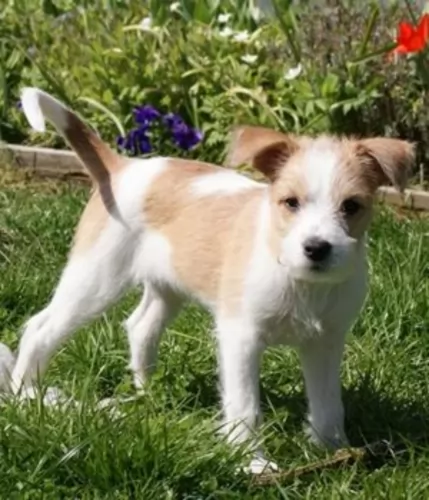 Fondly referred to as the Kromi or the Lander, the purebred Kromfohrlander, known as a companion dog, is medium sized.
Fondly referred to as the Kromi or the Lander, the purebred Kromfohrlander, known as a companion dog, is medium sized.
Both males and females stand at roughly 38 – 46cm in height and they weigh about 9 – 16kg.
They have two different coat types – the smooth haired one and the rough haired one, both coming with a soft undercoat. The dog is a moderate shedder. If you really want to be smart then the smooth coat is referred to as Glatthaar and the wire-haired Rauhaar. The color of the coat is white with brown, orange tan markings with the ears and part of the face mostly covered in the brown/tan markings.
The head of the dog is fairly round shaped and he has half-erect, half floppy ears. His legs are straight and firm and the medium length isn’t docked.
The Kromfohrlander is known for being a loving family pet that loves nothing more than staying within reach of one of his human family members. This closeness with his people means that he can adapt to life in the city or the countryside, so long as he is with his humans.
Wherever he lives though, because he is such an active dog he will require a good dose of mental- and physical stimulation. He is a docile dog, but not timid and not aggressive either, being friendly and amicable by nature. He makes a great playmate for children and is willing to get along with other pets in the home too.
The Moscow Water Dog was intelligent, vigilant, an excellent swimmer, and great in artic waters. However, he was too aggressive and instead of saving the swimmer, they would attack them. The Moscow Water Dog is a tall, balanced and powerful dog. They have a wide muzzle and a square head like the Newfoundland. Their eyes are dark and small while the ears are triangular. The nose and lips are black. He has webbed feet of course and a hanging tail.
The coat on the Moscow Water Dog was of course waterproof and double. The top coat is very dense, straight and soft. It is usually a dark brown with some black and white.
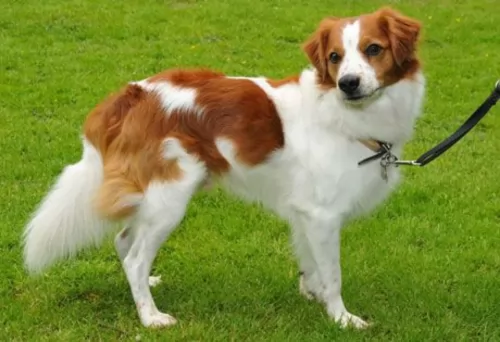 The Kromfohrländer is one of those dogs that has been bred specifically to be man’s best friend.
The Kromfohrländer is one of those dogs that has been bred specifically to be man’s best friend.
When you delve into his history you see that he has never had any particular role as a working- or hunting dog but that he has been bred to be a companion animal.
He can’t be left alone for too many hours as his very nature makes it that he longs to be around his human family constantly. He is therefore not a dependant dog, relying totally on his human family for his sense of well-being.
Low maintenance, easy-going, loving, devoted, lively and social, when you bring the medium-sized Kromfohrlander into your home, it won’t be long before he will have crept into your heart as well.
yes
Swimming and stamina
Yes but needed some land. Better in countryside.
This is an intelligent dog, but he could not be trained out of his aggressiveness.
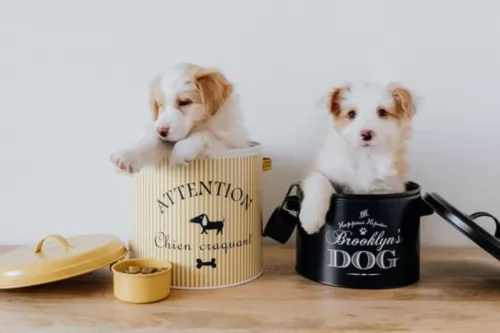 Feisty, energetic, full of life, entertaining and comical, your Kromfohrlander is intelligent too and with good care, exercise and lots of love your dog will maintain all these good characteristics and reach anything from 12 to 16 years of age.
Feisty, energetic, full of life, entertaining and comical, your Kromfohrlander is intelligent too and with good care, exercise and lots of love your dog will maintain all these good characteristics and reach anything from 12 to 16 years of age.
However, there are some dog illnesses that could affect your dog such as hip dysplasia, ear- and eye infections such as lens luxation which can actually cause loss of vision, cancer, diabetes, epilepsy, bloat and others.
Dogs that are ignored in terms of getting enough exercise are prone to weight gain and this in itself can lead to joint disease and other illnesses.
Because the breed was around for such a short period there is not a lot of documentation or information regarding genetic or propensity health issues. There are however a few issues that just his heritage and Newfoundland blood would lend itself to.
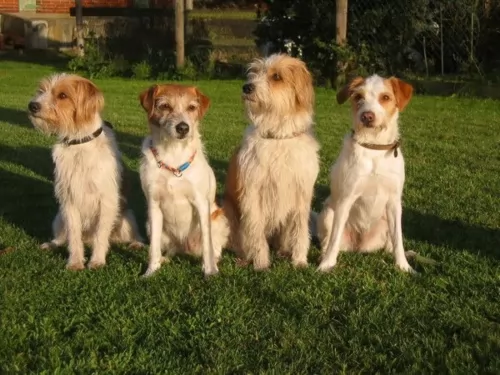 Your Kromfohrlander has two coat types - wirehaired or smooth. Don’t be overwhelmed by the brush and comb selections there are to keep his coat shiny ad healthy.
Your Kromfohrlander has two coat types - wirehaired or smooth. Don’t be overwhelmed by the brush and comb selections there are to keep his coat shiny ad healthy.
The idea is to simply choose a brush such as a bristle brush that can be used on all coat types. A brush like this will allow you to gently brush your pet’s coat to remove grass, dust and burrs and to make it a pleasant experience for your pet.
You want your Kromfohrlander to look forward to his brushing session. You can check him over for lumps, fleas and ticks at the same time.
Other grooming routines that your Kromfohrlander will need is nail clipping, checking inside and outside the ears for fleas and ticks as well as wax- and dirt build-up as well as teeth brushing. If teeth brushing for dogs is new to you there are pet groomers and even your vet who will offer this important service for you.
Required high quality food made specifically for large or giant puppies. Feed 3-4 times a day a total of 21/2 -3 cups.
Required high quality food made for large or giant dog breeds. Feed twice a day a total of 2 cups.
The Moscow Water Dog did not need a high level of exercise, but they did have a lot of stamina. They loved to swim. Not overly active – more of a couch potato.